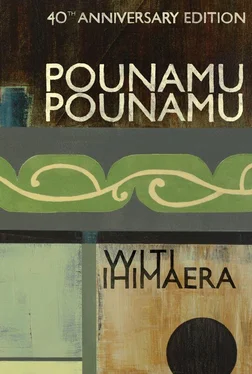‘And hopefully,’ Jack Simmons interrupts, ‘going straight to bed after their dinner too!’
Sally Simmons playfully nudges her husband. He winks at her. He himself knows it is too much to expect that the Heremaia children would go to bed so early. Heavens, he is lucky that the tribe has not invaded his house yet! He winces to himself. He may as well make the most of these quiet and unassailed moments.
If he were asked, Jack Simmons would never go as far as saying he disliked the Heremaia children. He rather liked them in a hesitant and cautious sort of way. Heavens, he had known very well when he was told his neighbours were Maori, that he would have to expect the worst. People had informed him so, but what the worst was, they had not told him; only that he was to expect it. In his case, the worst turned out to be the Heremaia children. Mind you, they were not always bad children and there were times when he liked them unreservedly. But at other times … he didn’t dislike them really, but he was, he’d have to admit, very wary of them. Their behaviour was so erratic and such a mystery! Sometimes they were pleasant and then unpleasant. Good and then bad. Honest, then dishonest. Generous, then mean. And even though they had received a sound Christian training, their sense of morality seemed to come and go, come and go, with the most astonishing ease. On Sunday mornings, Jack Simmons would watch them walking in single file to church, their faces scrubbed and beaming smiles in the general direction of Heaven, and he would sigh to himself. How could such apparent angels also be such proper little devils! Jack Simmons had long given up trying to understand them.
Take George, the eldest Heremaia boy: eleven years old, a handsome lad, usually courteous and very helpful. George definitely had good traits, but he also had itchy fingers and a tyrannical attitude over children smaller than himself. It was George who had master-minded the last of the raids made by the Heremaia children on Jack Simmons’ henhouse. Jack Simmons knew it was George because of the long and colourful feathers he was wearing in one of the interminable games of cowboys and Indians the children in the neighbourhood liked to play. Because George was the roughest and biggest boy in the street, the younger children always tried to get on his side when they played games. Those who weren’t, trembled in fear because when George went on the warpath, the cowboys always lost. You could never shoot George; he always refused to stay dead. If he shot you with an arrow, it was better not to argue with him. Otherwise, he’d take you captive and devise horrible tortures for you. Better to groan, clutch at your heart, fall down and suffer your hair to be pulled while George went through the motions of scalping you.
Henare, a year younger than George, possessed a similar flaw in his character. Like his brother’s, it showed itself in the games the children liked to play. Henare was known to all and sundry as The Cheat. No matter what the game, Henare could always be counted on to win it by devious and underhand methods. On one occasion he’d used a marble the size of a pingpong ball to beat Mark in a game of marbles. That was the trouble with both George and Henare: they had no notion whatsoever about fair play. Admittedly Henare had redeemed himself by returning Mark’s marbles, but that was because he’d wanted another game and nobody else would play with him. Mark, as usual, lost again.
‘Why do you keep playing with him, Mark?’ Jack Simmons had asked.
‘Because he’s my friend!’
‘But he cheats you so.’
‘He’s still my friend. Anyway, he’ll soon get tired of playing marbles and then he’ll give them all to me. He said he would. He’s my friend!’
But these were only incidental flaws, and all the Heremaia children possessed them. Jack Simmons could tolerate them, but there were two traits he would not stand: the curiosity in the Heremaia children which led them to ‘borrowing’ and then the audacity to deny that they were responsible.
There was the time, for instance, when Jack Simmons had asked them if they knew where his missing bicycle was. He suspected them but every smile and counterfeit tear was designed to prove their innocence; every sigh and gesture expertly tailored to show that they couldn’t have done it, not they.
‘Mr Simmons, you don’t really believe we could have taken it, do you? (Sigh). Oh, Mr Simmons! (Shocked outburst, eyes wide with horror). But we didn’t take your bike, truly! (Hands pressed to breasts). Cross our hearts and hope to die if we tell a lie! (And they crossed their hearts too!)’
They were so good at it you felt you had to applaud. They used every body movement and every facial expression that they possessed in their vast and formidable repertoire: rolled eyes, sad-lidded eyes, a tear or two depending on the enormity of the accusation, a couple of long sighs and gurgles, an entreating gesture of the hand, a slight quivering of the lips, more tears if they were necessary, an occasional wail … and all accompanying the Great Explanation.
‘We couldn’t have taken your bike today, Mr Simmons, because we went to church. It isn’t Sunday? Oh, we remember now, we went down to the river for a swim. We walked all the way too, Mr Simmons, you can ask Mrs Davidson. Has Mrs Davidson really gone away for the weekend? Gosh, some people are lucky! No, it couldn’t have been her that saw us then. Well, um, it must have been Mrs Keith. Yes, we walked all the way, true! And Jimmy had a sore leg, too. Show Mr Simmons your sore leg, Jimmy. See? Come to think of it, we did see a boy with a bike like yours down at the river. That’s right, and Annie did say: “Hey, you fellas, that looks like Mr Simmons’ bike!” But we said to her: “Can’t be, because Mr Simmons always locks his bike so we can’t pinch it.” It must have been your bike, eh, Mr Simmons! If only you’d told us before that it was missing, Mr Simmons. We would have given that boy a good hiding, because you’re our best friend. No, we don’t know who he was. Never seen him before. Aren’t some people awful thieves?’
In this case, despite the grand performance, Jack Simmons’ suspicions had proved correct. He’d gone down to the river and found his bicycle together with an eye-witness who’d definitely seen George riding it. So he’d had it out with the children again.
‘But we told you we’d taken it, Mr Simmons! Didn’t we tell you? We’re sure we told you, we all heard each other. See, Mr Simmons, six against one! We’re not liars. You’re our friend. Oh, no, we didn’t steal it. We wouldn’t do such a thing. Anyway, you always said we could take your bike when we wanted it. Yes, you did. Can’t you remember? Mr Simmons, we all heard you, six against one. So we couldn’t have stolen your bike, could we? We just borrowed it and borrowing isn’t stealing, is it? No, we won’t do it again. Cross our hearts and hope to die if we tell a lie, Mr Simmons! It was only that poor Jimmy here had a sore leg. Not that leg, Stupid! Yeah, and Jimmy fell down and we thought he was crippled. That’s why we took your bike. It was an emergency, and you always said that in an emergency we could use your bike. When is Mrs Davidson coming back? Yes, cross our hearts, Mr Simmons. But wasn’t it lucky that we took your bike, because if it hadn’t been us, bet some other kids would have pinched it. You just left it lying against the fence and Annie said: “We better take Mr Simmons’ bike before a thief gets it.” That’s why we took your bike. Aren’t we good?’
Jack Simmons had since come to understand that borrowing was a common Maori trait: what’s yours is mine, what’s mine is yours. Maybe it was acceptable practice among Maori people but this city suburb was certainly not a Maori community. Things were different now. The land, its occupants and their possessions no longer belonged to them. It belonged to him, Jack Simmons. His land was like the land bought by settlers after the Treaty of Waitangi.
Читать дальше












